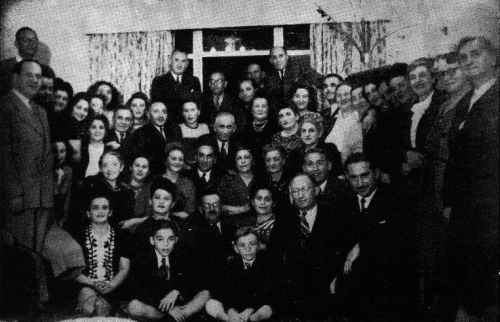 |
|
|
[Page 243]
by Abba Zussmanovitz
A dispute and a bitter fight in the house of learning (Bet Hamidrash)
It was during Shabbat Bereshit. Zalman Hershe Zonas, who was a peddler selling animal skins to the people from the villages, wanted to be the reader that Shabbat. He went over to the reader's stand and started praying. Those sitting on the benches on the east side (“ mizrach”) were surprised at Zalman's audacity in walking over to the reader's stand without permission. They opposed it aggressively and demanded that he should step down and let someone else lead the prayers on Shabbat Bereshit. Zalman did not give way and a big commotion ensued. Many sided with Zalman. They went up to the pulpit and demanded that Zalman should continue to pray at the stand (“ amud”). They threw “shtandars” at the Jews on the east side. When they tried to get out of Bet Hamidrash, Zalman's friends locked the doors. A big fight broke out in the house of prayer and many were injured. This dreadful incident is kept in my memory.
From the Village's Way of Life
One rainy day, Zalman Hirshe Zonas was seen wearing a sack over his head. And about that people in Gorzd said: “ Zalman haut zich ongeton a meise.” (“ Meise” in colloquial Lithuanian means “ a sack”; “ongeton a meise” means “ took his own life,” God forbid.)
[Page 249]
by Yehudis Leshem
Translated by Gloria Berkenstat Freund
When the name of my dear shtetele [small town] Gordz reverberates in me with unending sadness, when the holy names sink into my soul with so much warmth, with so much love and nostalgia for the place where my cradle stood, I see you my dear annihilated shtetele. I see you with your Jews, I see the environment where we lived and wove our young dreams. Types, shapes, scenes, pictures, fragments surface in my memories.
|
|
But who is it that has the standing to reveal everything and describe it all?
The language is poor and the pen weakly describes the feelings and memories that ask to be recorded, recorded for the generations, but who if not us – the last remaining few score Gordzer in Israel and around the world – will do it?
*
As from a distant, but close past, I will evoke your sacred name my dear shtetele and erect a worthy headstone for you.
So I see you my home shtetele before my tear-filled eyes as I remember you and when I write these memorial lines, how you once were before the destruction floats in my memories.
Your modest and small alleys in which our Gordz Jews walked are dear, very dear to me; your Shabbosim [Sabbaths], yom-tovim [holidays] and your weekdays and everything in you that breathed with warmth, familiarity, with conflict and sanctity is dear to me; everything that was so brutally erased forever by the villainous hands and everything that these murderous hands eradicated from you, so that no memory would remain.
All of this does not leave my eyes and does not stop my soul from having an indescribable grief. I see all of you vanished sacred people who were all so loved and dear to us.
A full-blooded Jewish life flowed in your houses of prayer and institutions, an entire world of events took place in your wooden houses, a life of need and struggle, but also with quiet joys.
Life passed colorfully, noisily and slowly in our shtetele and, now from all of this, there remains a place of suffering and torture.
[Page 251]
Gordz, you have gone forever and all that lived and created during the course of generations has disappeared.
Our mournful shtetele, you are now laid waste and destroyed. No Jewish feet tread on your stones any longer. Everything was erased and annihilated in ash and in flame.
My lips now murmur the Kaddish [memorial prayer] for you who are like a quiet dove, choked by the Nazi murderers and their Lithuanian collaborators.
May my poor lines serve as a garland of flowers on the mass grave of our holy Gordz martyrs.
|
|
|
|
JewishGen, Inc. makes no representations regarding the accuracy of
the translation. The reader may wish to refer to the original material
for verification.
JewishGen is not responsible for inaccuracies or omissions in the original work and cannot rewrite or edit the text to correct inaccuracies and/or omissions.
Our mission is to produce a translation of the original work and we cannot verify the accuracy of statements or alter facts cited.
 Gargzdai, Lithuania
Gargzdai, Lithuania
 Yizkor Book Project
Yizkor Book Project
 JewishGen Home Page
JewishGen Home Page
Copyright © 1999-2024 by JewishGen, Inc.
Updated 8 Oct 2012 by MGH